Finance > EXAM REVIEW > C708 V4 Finance Notes – Module 8 Time Value of Money. Comprehensive finance notes in 11 short page (All)
C708 V4 Finance Notes – Module 8 Time Value of Money. Comprehensive finance notes in 11 short pages. Best for quick revision.
Document Content and Description Below
C708 V4 Finance Notes – Module 8 Time Value of Money • Explain the concept of time value of money (TVM) • Defining the Time Value of Money - The Time Value of Money is the concept that money ... is worth more today that it is in the future. • Being given $100 today is better than being given $100 in the future because you don't have to wait for your money. • Money today has a value (present value, or PV) and money in the future has a value (future value, or FV). • The amount that the value of the money changes after one year is called the interest rate (i). For example, if money today is worth 10% more in one year, the interest rate is 10%. • Interest Rate (i or r): the cost of not having money for one period, or the amount paid on an investment per year. • Future Value (FV): the value of the money in the future. • Present Value (PV): the value of the money today. • Explain the importance of the five components of TVM, as applied in a calculation (discount rate, duration, payment, present value, future value) • Defining Time Value of Money - Time value of money is integral in making the best use of a financial player's limited funds. • Money today is worth more than the same quantity of money in the future. You can invest a dollar today and receive a return on your investment. • Loans, investments, and any other deal must be compared at a single point in time to determine if it's a good deal or not. • The process of determining how much a future cash flow is worth today is called discounting. It is done for most major business transactions during investing decisions in capital budgeting. • Discounting: the process of determining how much money paid/received in the future is worth today. You discount future values of cash back to the present using the discount rate. • Interest rate: the percentage of an amount of money charged for its use per some period of time. It can also be thought of as the cost of not having money for one period, or the amount paid on an investment per year. • Defining Single-Period Investment - Since the number of periods (n or t) is one, FV = PV (1 + i), where i is the interest rate. • Single-period investments use a specified way of calculating future and present value. • Single-period investments take place over one period (usually one year). • In a single-period investment, you only need to know two of the three variables PV, FV, and i. The number of periods is implied as one since it is a single-period. • Multi-period investment: an investment that takes place over more than one periods. • Periods (t or n): units of time. Usually one year. • Single-period investment: an investment that takes place over one period, usually one year. • Suppose you're making an investment, such as depositing your money in a bank. If you plan on leaving the money there for one year, you're making a single-period investment. Any investment for more than one year is called a multi-period investment. • This could also be solved with the TI-BA II plus using the following TVM inputs: N=1, I/Y=3, PV=-100, PMT=0 and [CPT] FV=103. • Defining Multi-period Investment - Multi-period investments take place over more than one period (usually multiple years). They can either accrue simple or compound interest. • Investments that accrue simple interest have interest paid based on the amount of the principal, not the balance in the account. • Investments that accrue compound interest have interest paid on the balance of the account. This means that interest is paid on interest earned in previous periods. • Simple interest increases the balance linearly, while compound interest increases it exponentially. • Accrue: To add, or grow. • Principal: The money originally invested or loaned, on which basis interest and returns are calculated. • • Simple interest is when interest is only paid on the amount you originally invested (the principal). You don't earn interest on interest you previously earned. • The second way of accruing interest is called "compound interest." In this case, interest is paid at the end of each period based on the balance in the account. The formula for compound interest is: • • Compound Interest: Interest is paid at the total amount in the account, which may include interest earned in previous periods. • Defining Future Value - The Future Value can be calculated by knowing the present value, interest rate, and number of periods, and plugging them into an equation. • The future value is the value of a given amount of money at a certain point in the future if it earns a rate of interest. • The future value of a present value is calculated by plugging the present value, interest rate, and number of periods into one of two equations. • Unless otherwise noted, it is safe to assume that interest compounds and is not simple interest. • Compound interest: interest, as on a loan or a bank account, that is calculated on the total on the principal plus accumulated unpaid interest. • When calculating a future value (FV), you are calculating how much a given amount of money today will be worth some time in the future. In order to calculate the FV, the other three variables (present value, interest rate, and number of periods) must be known. Recall that the interest rate is represented by either r or i, and the number of periods is represented by either t or n. It is also important to remember that the interest rate and the periods must be in the same units. That is, if the interest rate is 5% per year, one period is one year. However, if the interest rate is 5% per month, rather than per year, then t or n must reflect the number of periods in terms of months • Calculating FV - Calculating FV is a matter of identifying PV, i (or r), and t (or n), and then plugging them into the compound or simple interest formula. • The "present" can be moved based on whatever makes the problem easiest. Just remember that moving the date of the present also changes the number of periods until the future for the FV. • To find FV, you must first identify PV, the interest rate, and the number of periods from the present to the future. • The interest rate and the number of periods must have consistent units. If one period is one year, the interest rate must be X% per year, and vice versa. • Quarter: a period of three consecutive months (1/4 of a year). • Defining Single-Period Investment- When considering a single-period investment, n is one, so the PV is simply FV divided by 1 + i. • A single period investment has the number of periods (n or t) equal to one. • For both simple and compound interest, the PV is FV divided by 1 + i. • The time value of money framework says that money in the future is not worth as much as money in the present. • Interest rate: the percentage of an amount of money charged for its use per some period of time. It can also be thought of as the cost of not having money for one period, or the amount paid o [Show More]
Last updated: 1 year ago
Preview 1 out of 11 pages
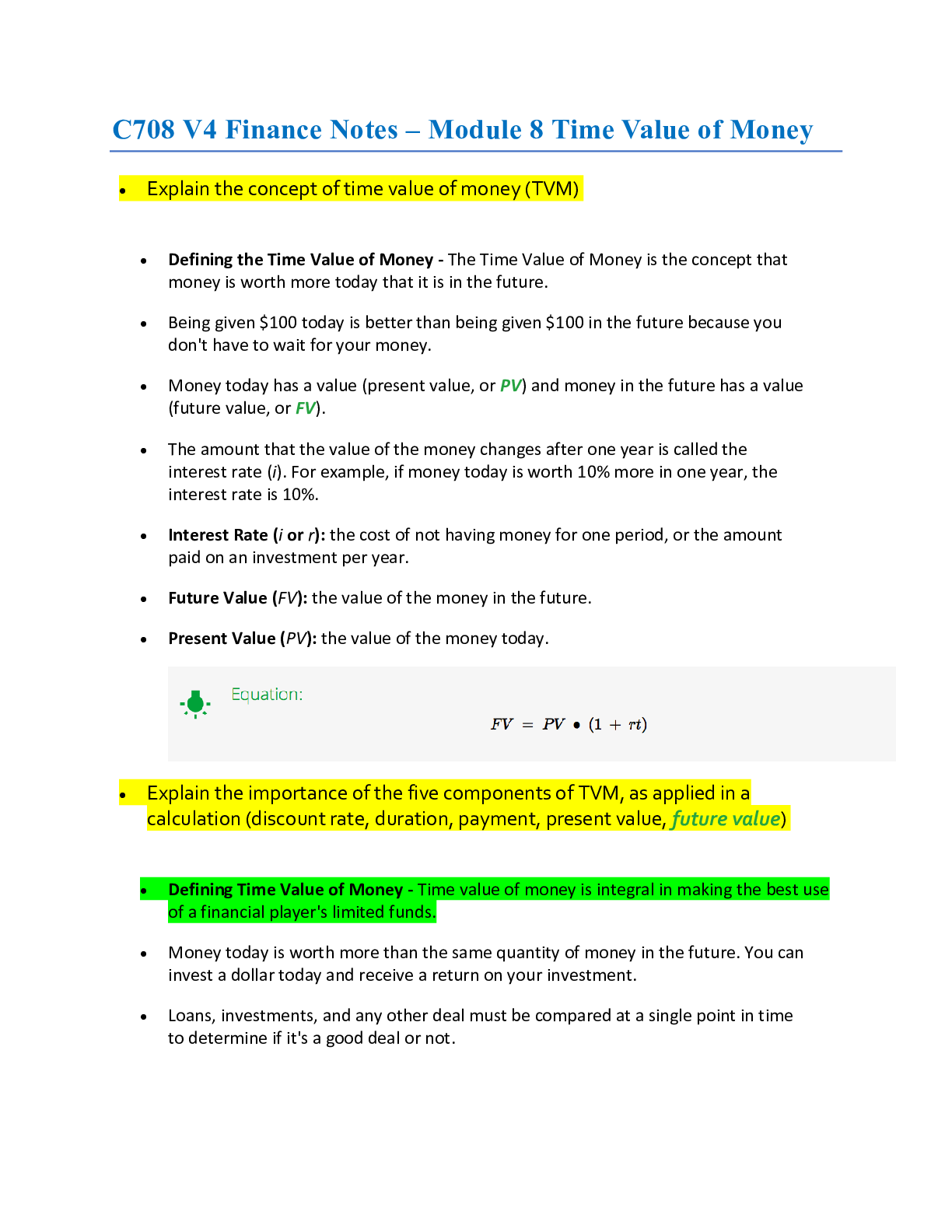
Reviews( 0 )
Recommended For You
*NURSING> EXAM REVIEW > NURS 6501 Midterm Exam Review Guide (Weeks 1-6. Compilation in 99 Pages) (All)
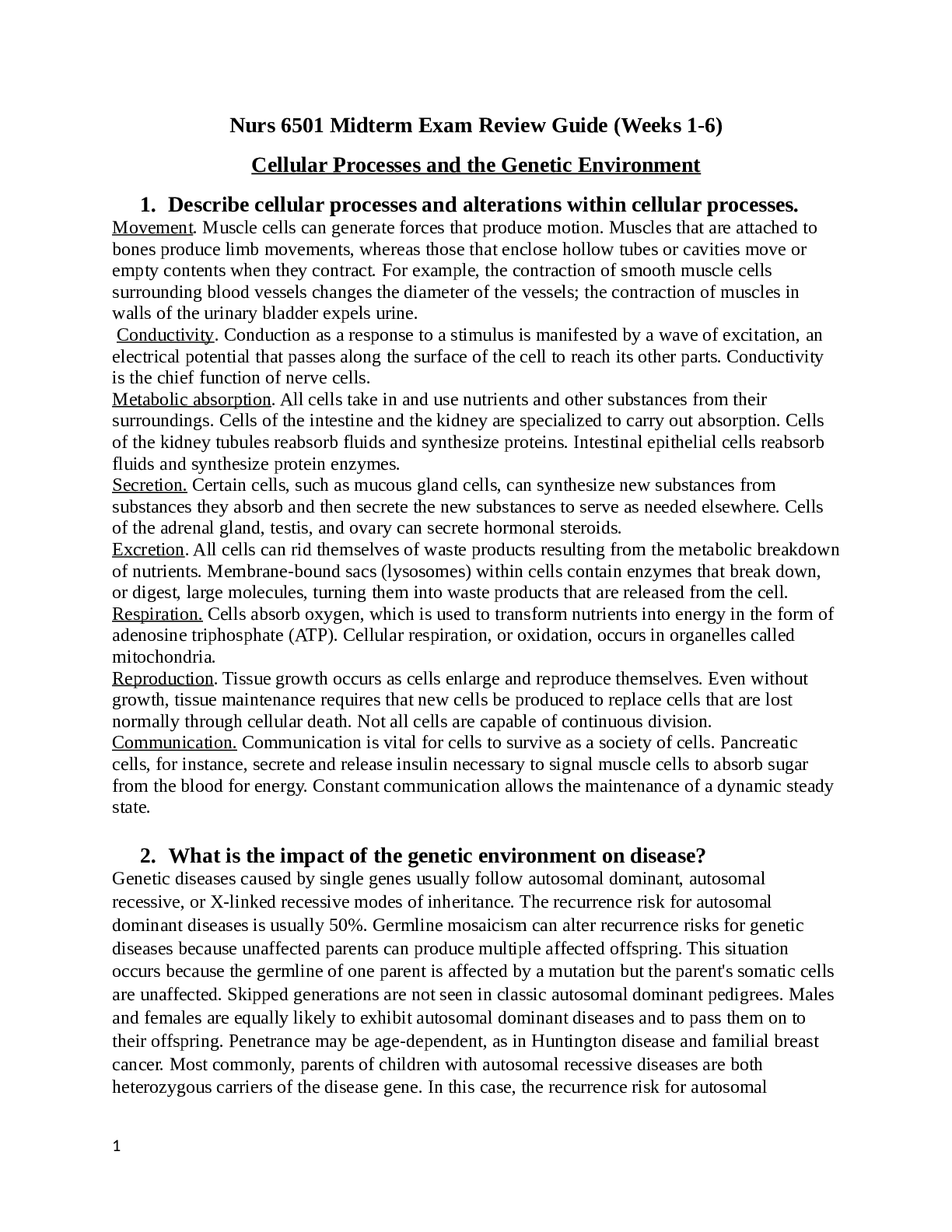
NURS 6501 Midterm Exam Review Guide (Weeks 1-6. Compilation in 99 Pages)
Nurs 6501 Midterm Exam Review Guide (Weeks 1-6) Cellular Processes and the Genetic Environment 1. Describe cellular processes and alterations within cellular processes. 2. What is the impact of t...
By SuperSolutions© , Uploaded: Nov 24, 2020
$15
*NURSING> EXAM REVIEW > NUR2063 / NUR 2063 Essentials of Pathophysiology Exam Review Latest Update Rasmussen College (All)
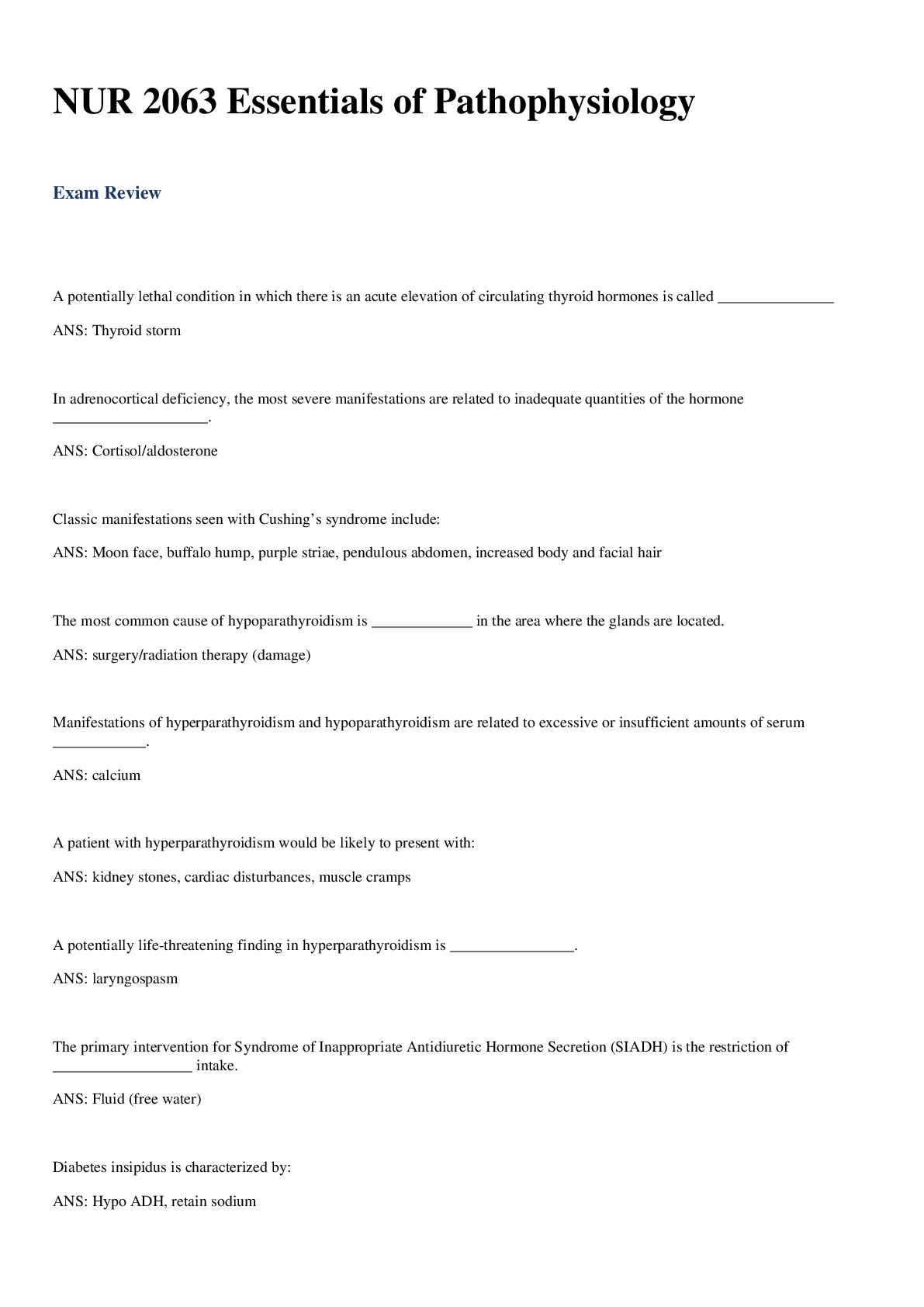
NUR2063 / NUR 2063 Essentials of Pathophysiology Exam Review Latest Update Rasmussen College
NUR 2063 Essentials of Pathophysiology Exam Review 1. A potentially lethal condition in which there is an acute elevation of circulating thyroid hormones is called _______________ - ANS: Thy...
By quiz_bit , Uploaded: Oct 28, 2020
$12
*NURSING> EXAM REVIEW > Multidimensional Care (MDC) 1 MDC EXAM 2 REVIEW -. (Rasmussen College) (All)
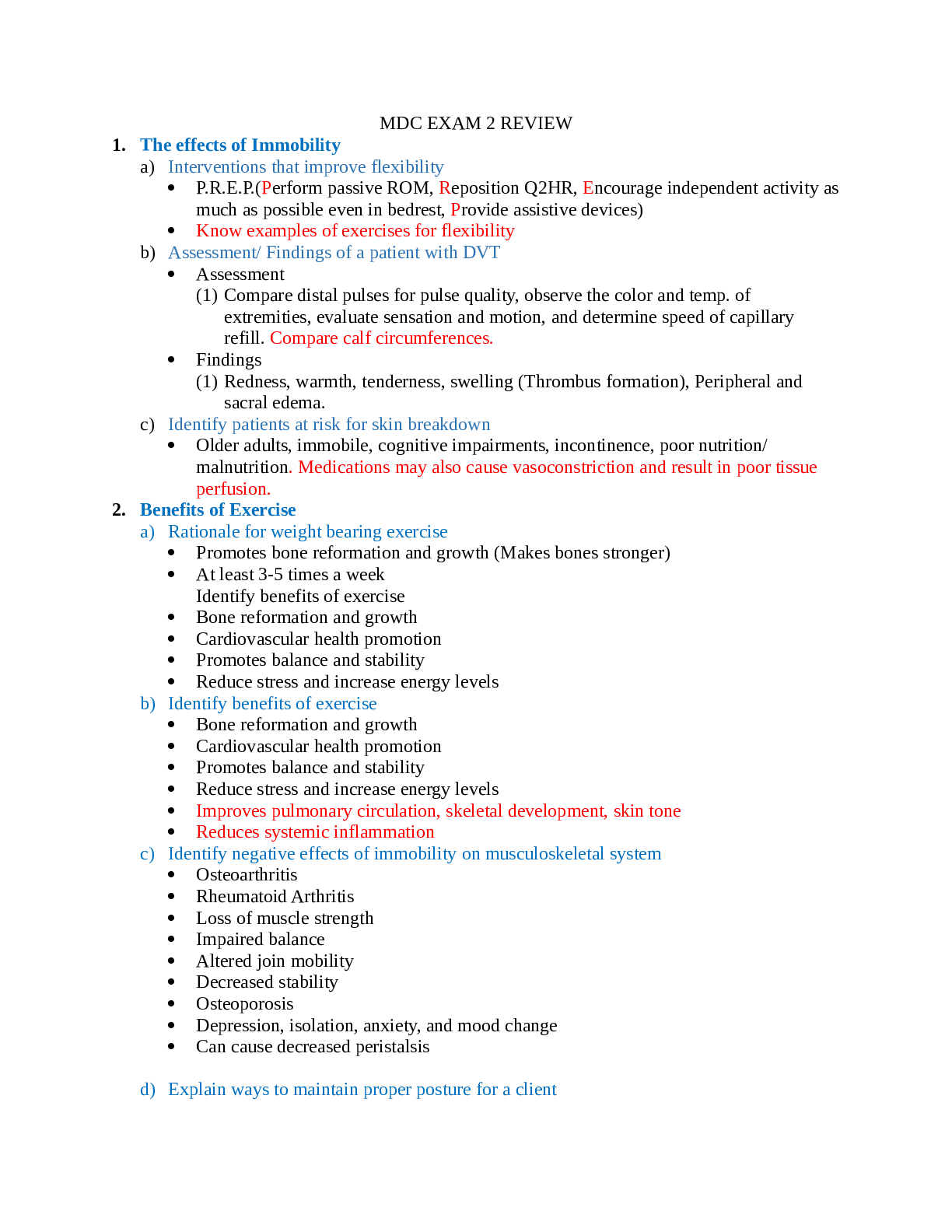
Multidimensional Care (MDC) 1 MDC EXAM 2 REVIEW -. (Rasmussen College)
MDC EXAM 2 REVIEW 11:19:19 1. The effects of Immobility a) Interventions that improve flexibility • P.R.E.P.(Perform passive ROM, Reposition Q2HR, Encourage independent activity as much as possible...
By SuperSolutions© , Uploaded: Dec 11, 2020
$11
*NURSING> EXAM REVIEW > NUR 2356 / NUR2356 Multidimensional Care I (MDC I) Exam 2 Review. Rasmusssen College (All)
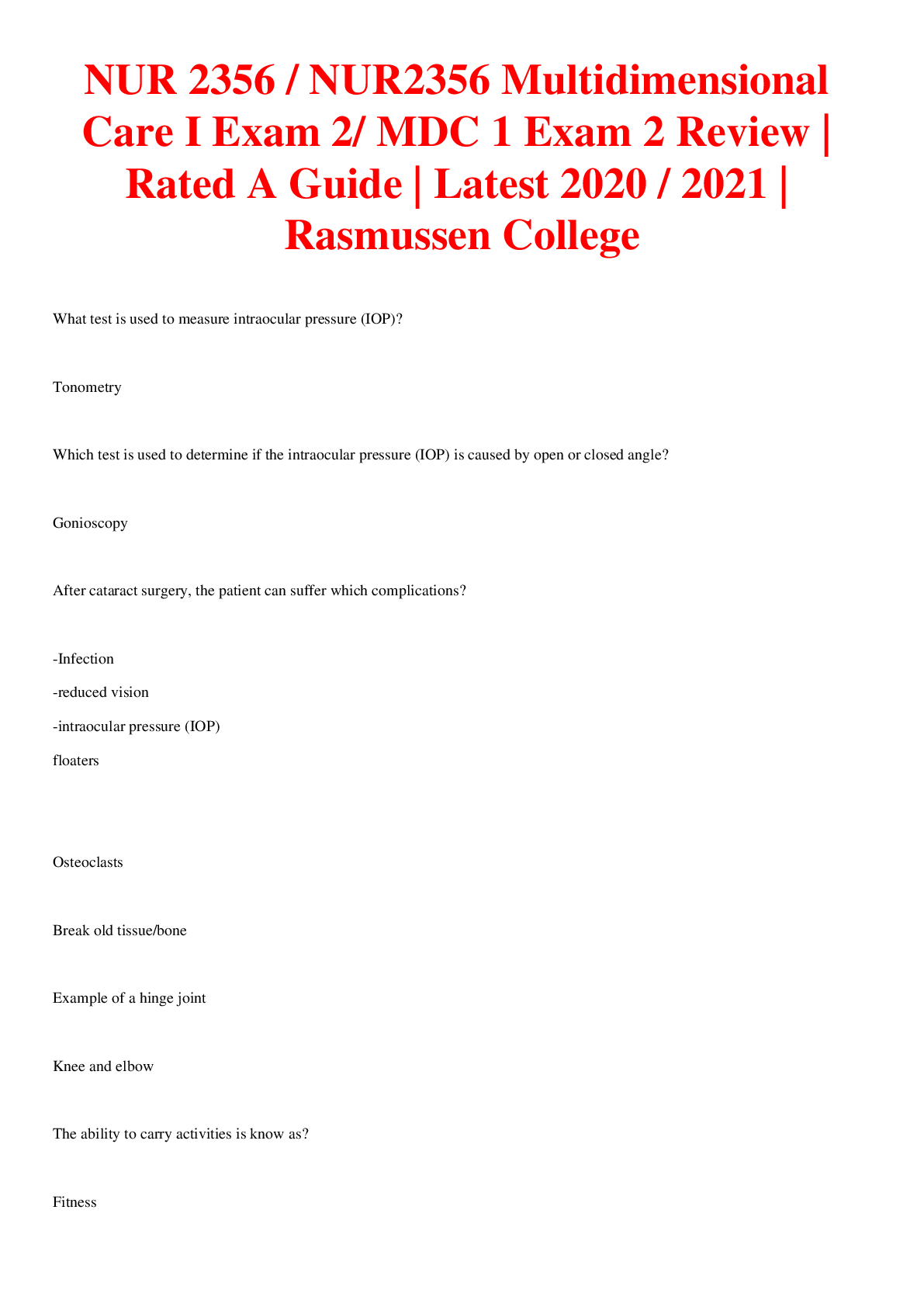
NUR 2356 / NUR2356 Multidimensional Care I (MDC I) Exam 2 Review. Rasmusssen College
1. What is a function of the musculoskeletal system? -Assist with movement 2. As a nurse you know that during aging, a normal musculoskeletal change would be? -A patient that came to the cli...
By nurse_steph , Uploaded: Nov 15, 2020
$11
*NURSING> EXAM REVIEW > NR566 / NR 566 Advanced Pharmacology for Care of the Family Final Exam Week 5 Review (Graded A) Chamberlain College of Nursing (All)
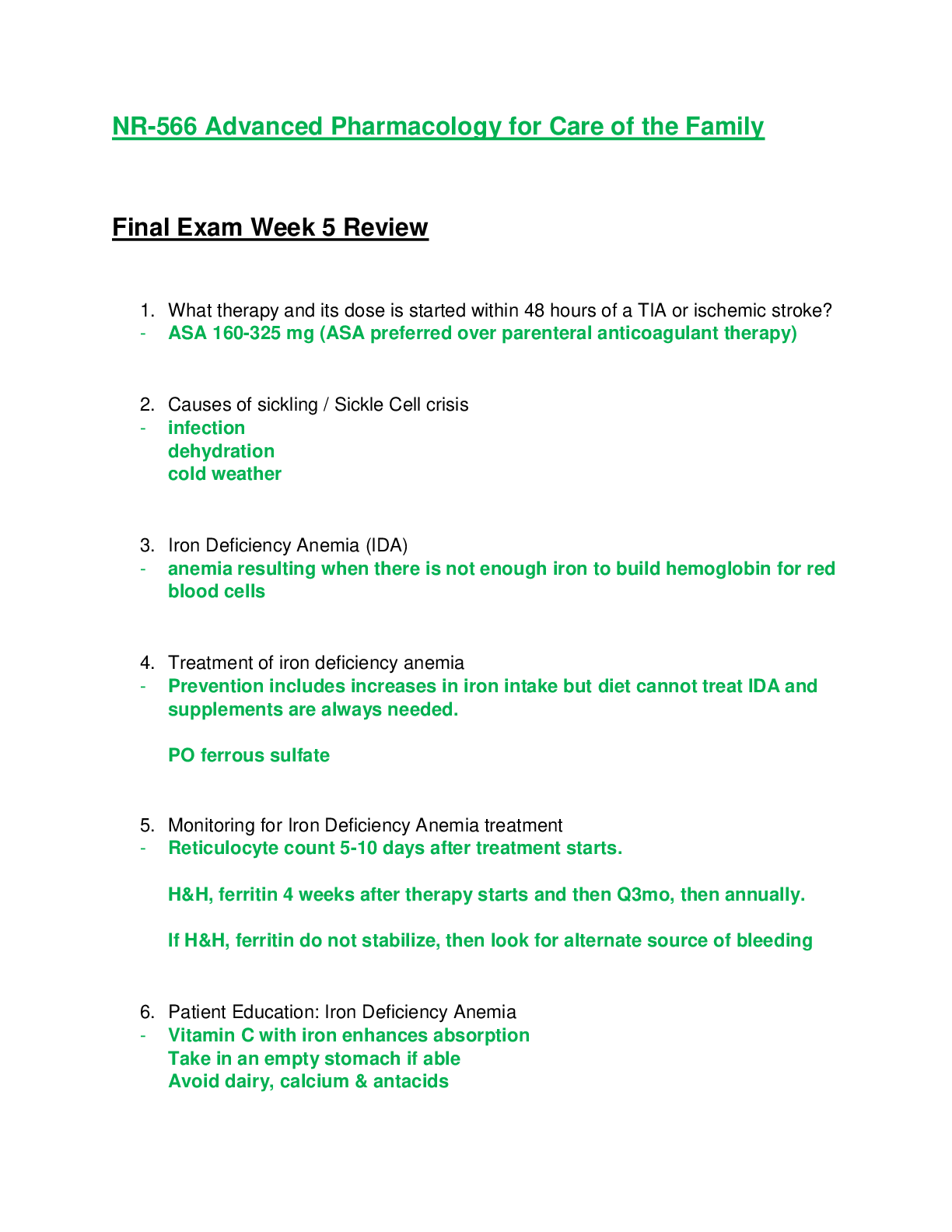
NR566 / NR 566 Advanced Pharmacology for Care of the Family Final Exam Week 5 Review (Graded A) Chamberlain College of Nursing
NR-566 Advanced Pharmacology for Care of the Family Final Exam Week 5 Review 1. What therapy and its dose is started within 48 hours of a TIA or ischemic stroke? - 2. Causes of sickling / S...
By quiz_bit , Uploaded: Oct 08, 2020
$9
*NURSING> EXAM REVIEW > NUR 2063 / NUR2063 Essentials of Pathophysiology Final Exam Review Modules 1 & 2 & 3 Latest Update Rasmussen (All)
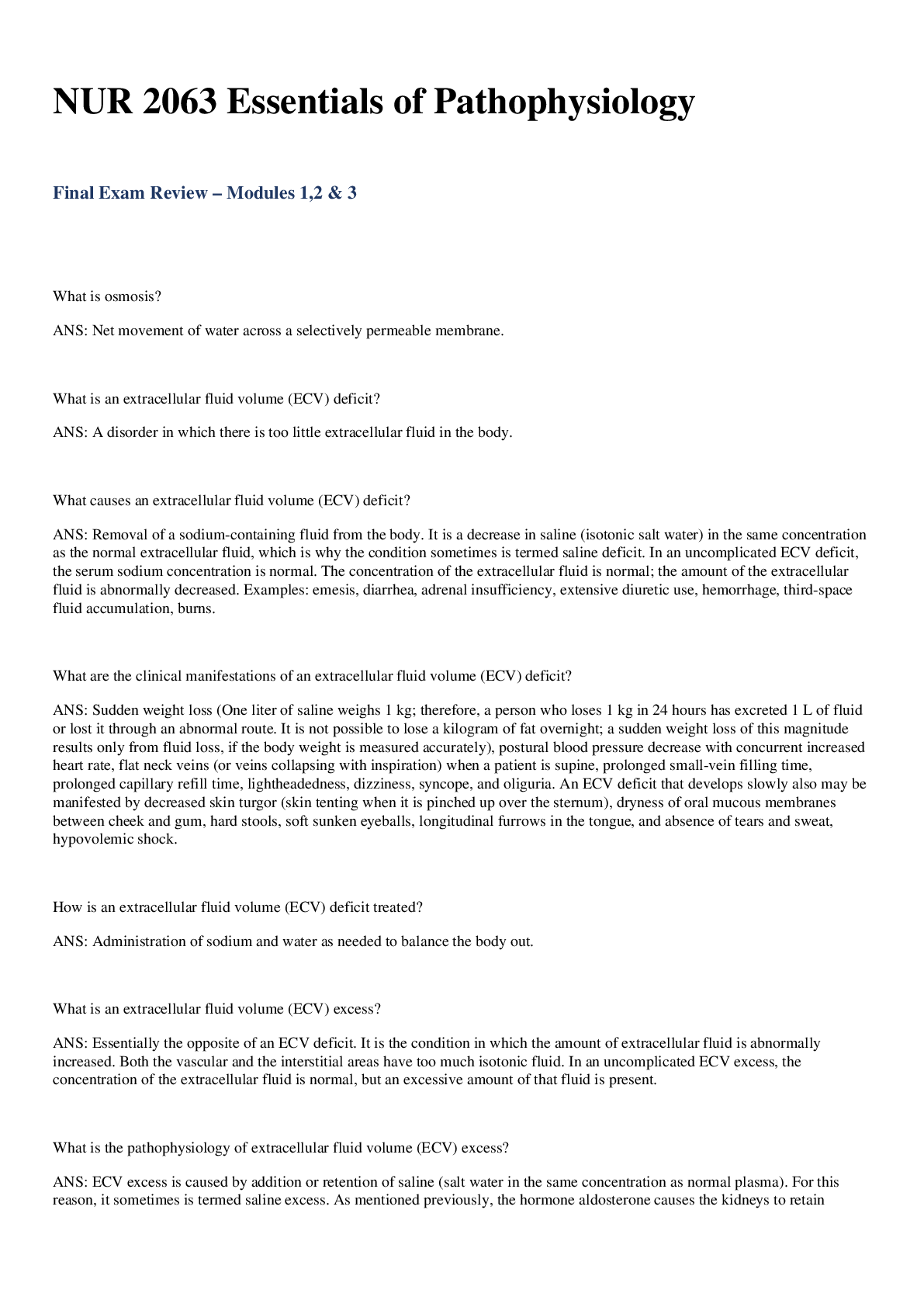
NUR 2063 / NUR2063 Essentials of Pathophysiology Final Exam Review Modules 1 & 2 & 3 Latest Update Rasmussen
Modules 1 & 2 & 3 Essentials of Pathophysiology Final Exam Review
By quiz_bit , Uploaded: Nov 02, 2020
$15
*NURSING> EXAM REVIEW > NURS 6501 / NURS6501 Advanced Pathophysiology - Module 8 Knowledge Check (Latest Update) Walden University (All)
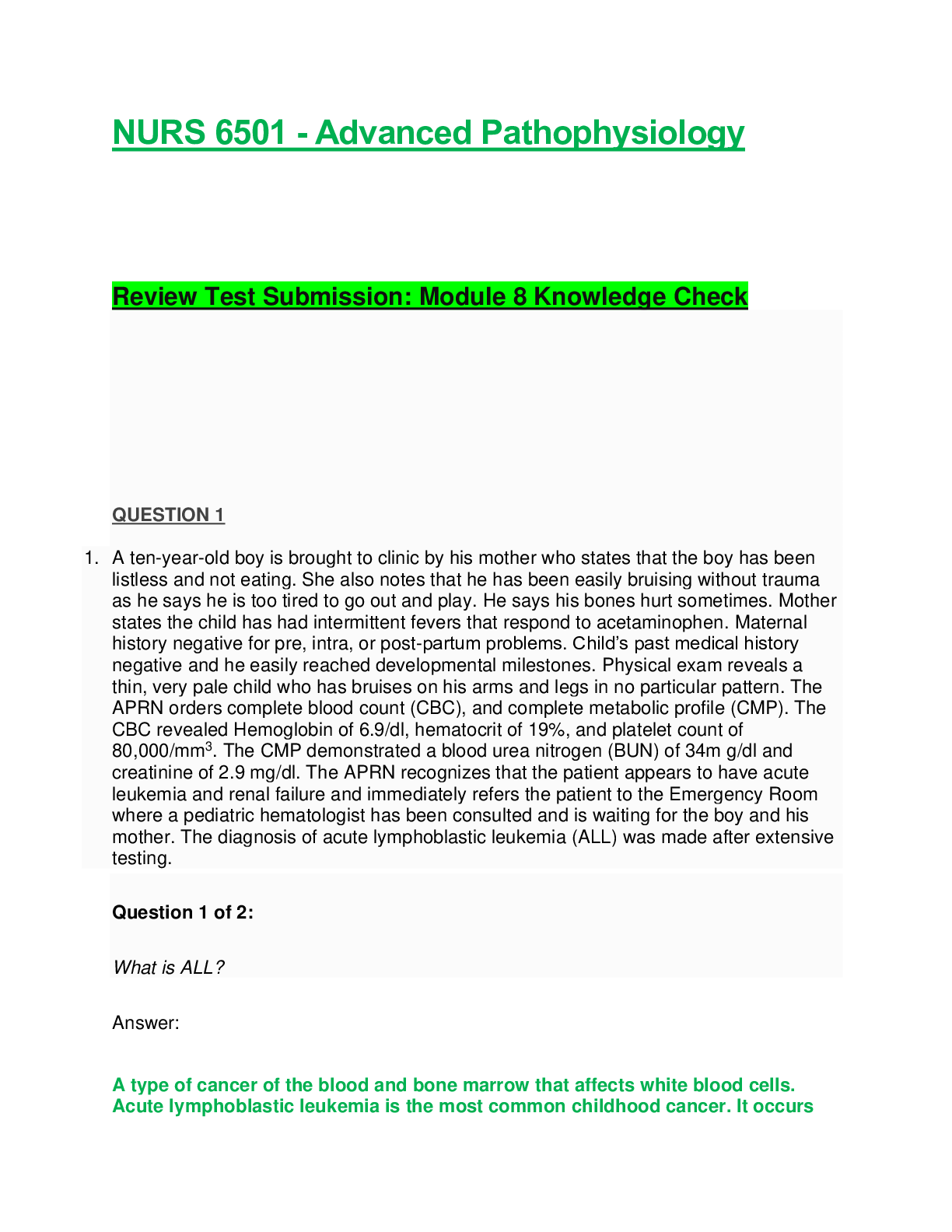
NURS 6501 / NURS6501 Advanced Pathophysiology - Module 8 Knowledge Check (Latest Update) Walden University
Review Test Submission: Module 8 Knowledge Check
By quiz_bit , Uploaded: Jan 13, 2021
$9.5
*NURSING> EXAM REVIEW > NR566 / NR 566 Advanced Pharmacology for Care of the Family Week 3 Quiz Study Guide . (Graded A) Chamberlain College of Nursing (All)
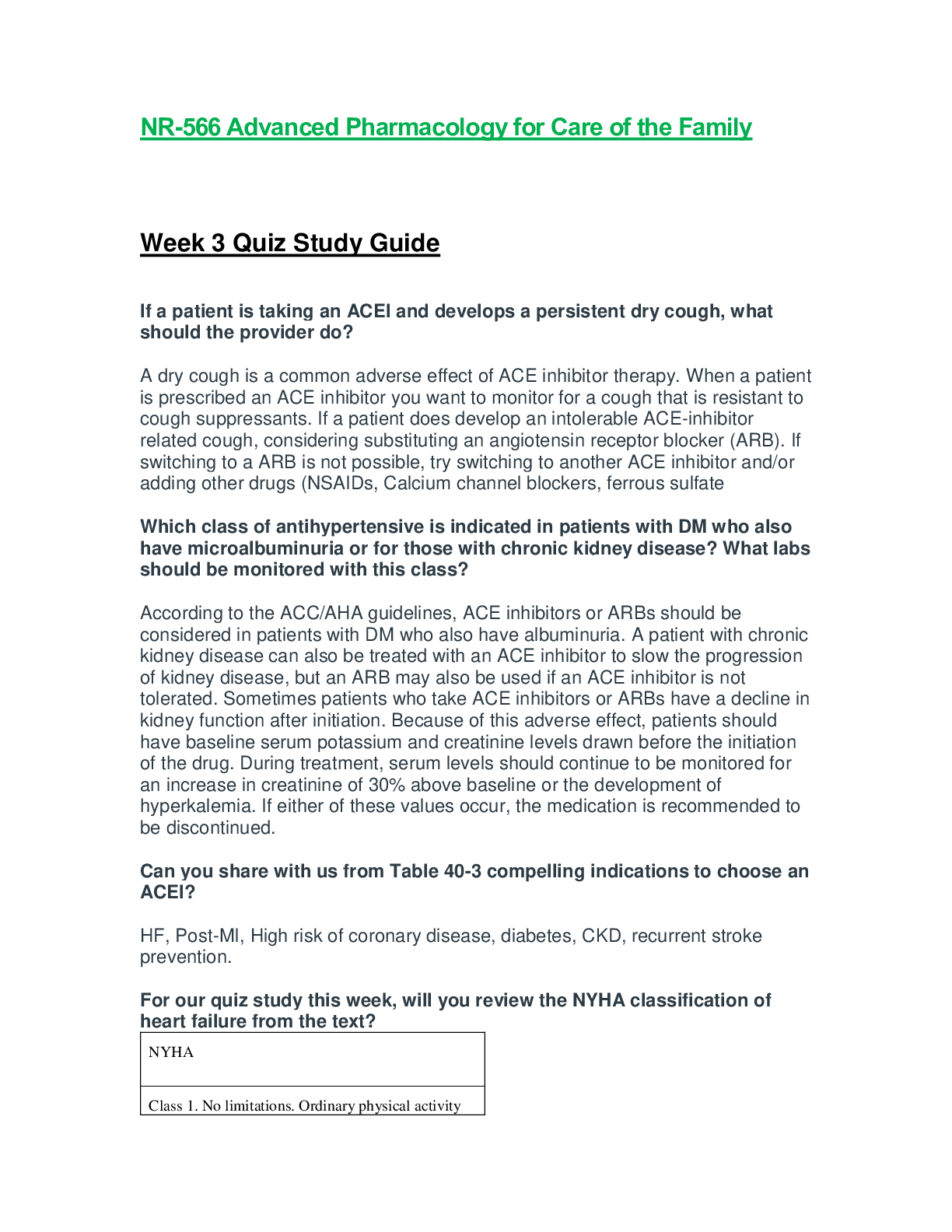
NR566 / NR 566 Advanced Pharmacology for Care of the Family Week 3 Quiz Study Guide . (Graded A) Chamberlain College of Nursing
NR-566 Advanced Pharmacology for Care of the Family Week 3 Quiz Study Guide If a patient is taking an ACEI and develops a persistent dry cough, what should the provider do? Which cl...
By quiz_bit , Uploaded: Oct 08, 2020
$15
*NURSING> EXAM REVIEW > NR566 / NR 566 Advanced Pharmacology for Care of the Family Midterm Exam Review . (Graded A) Chamberlain College of Nursing (All)
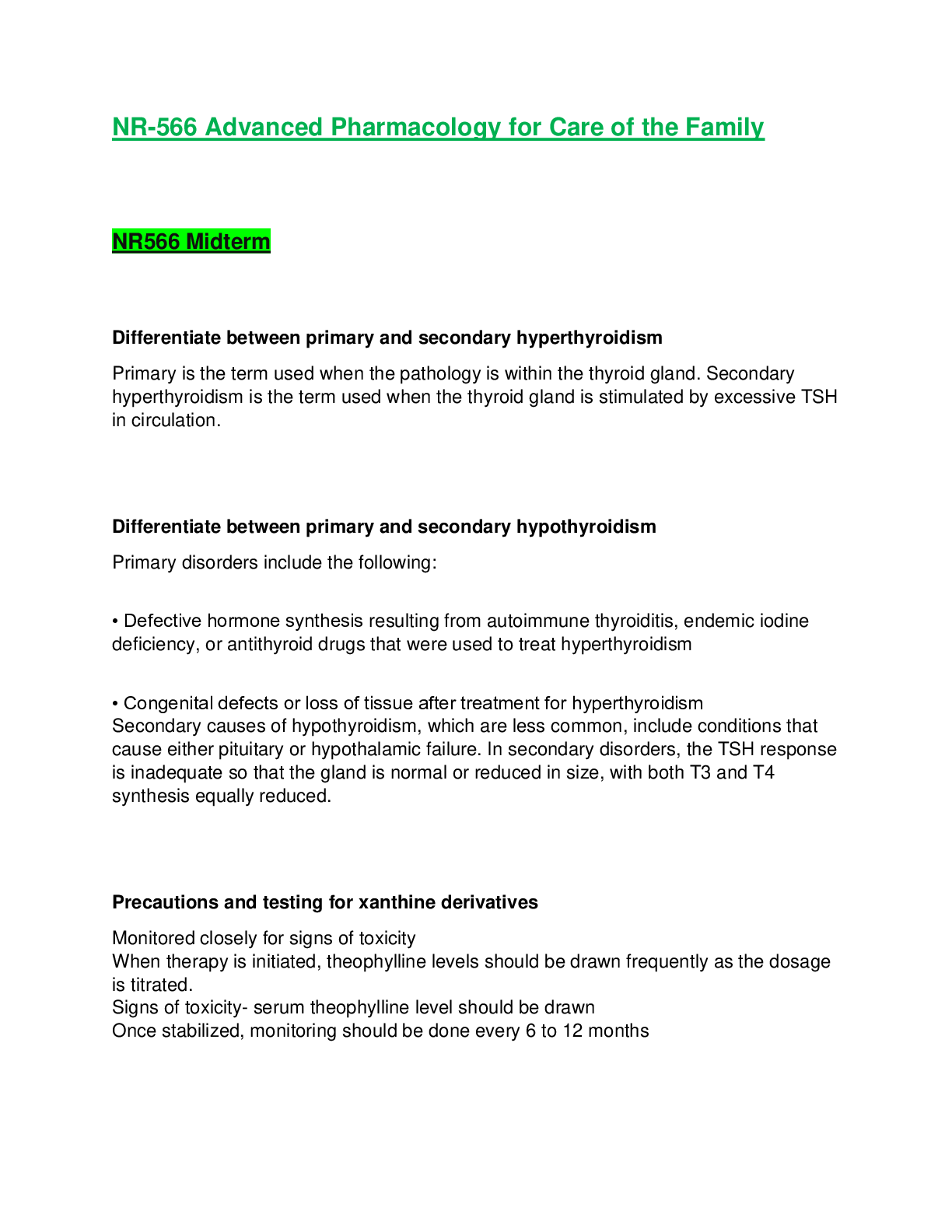
NR566 / NR 566 Advanced Pharmacology for Care of the Family Midterm Exam Review . (Graded A) Chamberlain College of Nursing
NR-566 Advanced Pharmacology for Care of the Family NR566 Midterm Differentiate between primary and secondary hyperthyroidism Primary is the term used when the pathology is within the thyro...
By quiz_bit , Uploaded: Nov 21, 2020
$14
*NURSING> EXAM REVIEW > NURS6650 / NURS 6650 Midterm Exam Walden University Review Latest Update (All)

NURS6650 / NURS 6650 Midterm Exam Walden University Review Latest Update
NURS 6650 - Psychotherapy with Groups and Families Midterm Exam Review 1. The PMHNP is providing family therapy to two parents and their twin 14-year-old children. The children become defian...
By quiz_bit , Uploaded: Nov 09, 2020
$9.5
Document information
Connected school, study & course
About the document
Uploaded On
Dec 19, 2020
Number of pages
11
Written in
Additional information
This document has been written for:
Uploaded
Dec 19, 2020
Downloads
0
Views
95






